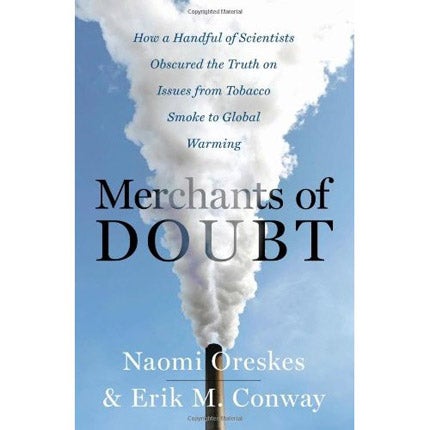Merchants of Doubt, By Naomi Oreskes & Erik M Conway
A lot of hot air from the sceptics

Your support helps us to tell the story
From reproductive rights to climate change to Big Tech, The Independent is on the ground when the story is developing. Whether it's investigating the financials of Elon Musk's pro-Trump PAC or producing our latest documentary, 'The A Word', which shines a light on the American women fighting for reproductive rights, we know how important it is to parse out the facts from the messaging.
At such a critical moment in US history, we need reporters on the ground. Your donation allows us to keep sending journalists to speak to both sides of the story.
The Independent is trusted by Americans across the entire political spectrum. And unlike many other quality news outlets, we choose not to lock Americans out of our reporting and analysis with paywalls. We believe quality journalism should be available to everyone, paid for by those who can afford it.
Your support makes all the difference.Public scepticism about climate change is on the rise.
The shift is due in part to the publication of the hacked emails of the University of East Anglia's "climategate" scientists. Now climatologists have to live with the fact that most people simply don't trust them. Merchants of Doubt, by two historians of science, may help restore some trust by showing that science is rarely black and white, and how its shades of grey have sometimes been distorted by a few willing hands.
Writing before "climategate", Naomi Oreskes and Erik Conway believe that "We all need a better understanding of what science really is...and how to separate it from the garbage." They tell the story of how for half a century, a small group of scientists in America collaborated with think-tanks and corporations in campaigns to discredit scientific research by creating doubt and manipulating debate.
Manufacturing doubt as an effective corporate strategy was first developed by the American tobacco industry. Determined to stop any government regulation in the face of scientific evidence linking tobacco to lung cancer, the cigarette-makers created the Council for Tobacco Research to discredit the scientists and dispute their findings. "Doubt is our product," boasted a now infamous 1969 industry memo. Doubt would shield the tobacco industry from litigation and regulation for decades to come.
The so-called "Tobacco Strategy" was used to "maintain the controversy" by promoting claims contrary to research. The peddlers of doubt insisted that scientists were wrong about the risks of Ronald Reagan's Strategic Defence Initiative, and that acid rain was caused by volcanoes. They would dismiss global warming by claiming, in turn, that there was none; if there was, it was just natural variation; finally, it didn't matter because humans would adapt. Aided by a complicit media, these claims generated the illusion of genuine scientific debate when there was none at all.
No scientific conclusion can ever be proven with certainty, but it is no more a "belief" to say that the Earth is heating up than to say that continents move or that germs cause disease. Oreskes and Conway warn that, “without some degree of trust in our designated experts we are paralyzed”.
Join our commenting forum
Join thought-provoking conversations, follow other Independent readers and see their replies
Comments